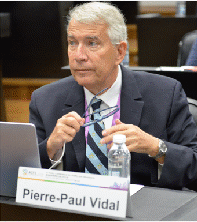主题:Human-Machine Interface
报告人:Pierre-Paul Vidal教授
时间:2024年5月31日15:00-16:00
地点:4教127
主持人:曹九稳教授
报告题目:Anthropomorphism and Enmachinement Severely Limit the Operator's Ability to Operate Complex Man-machine Interfaces
报告摘要:Human behavior relies on complex neural processing in multiple networks that cross-reference data from motor and sensory systems, including in operators of complex man-machine interfaces. One of the mechanisms involved is the concept of efference copying. It is used to predict the sensory consequences of a specific behavioral action in progress, thus making it possible to dissociate self-generated (reafferent) sensory information and extrinsic sensory information, i.e. generated by interactions with the environment. The mechanism also applies to tool manipulation. Embodiment can be defined as the ability to develop hybrid internal models, including the body and an object, to model body dynamics complemented by that object. We propose to use the term enmachinement instead of embodiment to distinguish the case where the object to be controlled is a complex machine rather than a simple hand-operated tool. Given the increasing complexity of machines over the last century, the question of the limits of enmachinement arises. In other words, is it biologically plausible for the central nervous system to develop precise hybrid internal models that fuse the characteristics of complex machines such as helicopters, airplanes and their operators? It's clearly possible, since pilots effectively control their aircraft, but we propose that this has a cost and limits.
报告人简介:
 Pierre-Paul Vidal,教授,法国国家医学博士,法国国家科学博士,法国国家科学研究中心(CNRS)特级主任研究员。发表300多篇SCI顶级科学论文及著作,引用率8300次。神经科学、生理学、耳前庭、人体姿态、运动感知和智慧健康研究领域的国际顶级专家,获得CNRS卓越科学成就奖。曾担任5个SCI国际杂志的编委,Nature(自然科学)等13个SCI国际杂志的专家评委,NASA(美国国家航空航天局), CNES(法国国家航空航天局)、NSF(美国国家科学基金会)等15个国际及欧美科研组织及科学基金的科学专家和评审委员会成员,Society for Neuroscience等9个国际学术组织的主席或专家委员。
Pierre-Paul Vidal,教授,法国国家医学博士,法国国家科学博士,法国国家科学研究中心(CNRS)特级主任研究员。发表300多篇SCI顶级科学论文及著作,引用率8300次。神经科学、生理学、耳前庭、人体姿态、运动感知和智慧健康研究领域的国际顶级专家,获得CNRS卓越科学成就奖。曾担任5个SCI国际杂志的编委,Nature(自然科学)等13个SCI国际杂志的专家评委,NASA(美国国家航空航天局), CNES(法国国家航空航天局)、NSF(美国国家科学基金会)等15个国际及欧美科研组织及科学基金的科学专家和评审委员会成员,Society for Neuroscience等9个国际学术组织的主席或专家委员。
